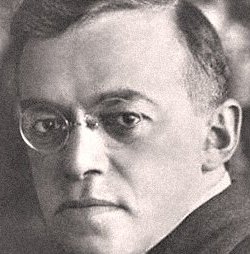|
Vladimir Jabotinsky
by Paul Eidelberg
Vladimir Jabotinsky was one of the greatest Jewish statesmen of the
twentieth century. His life is the portrait of an extraordinary if not
miraculous personality, a man of impeccable character: truthful and
wise, modest and magnanimous, fearless and compassionate, and wholly
dedicated to the welfare of the Jewish people.
Jabotinsky, who died in 1940, was a philosophic-statesman.
His words remind us of the wisdom and humor of Abraham Lincoln. To read
this unsurpassed orator — who could address and inspire audiences in seven
different languages — is an experience that cannot but encourage any
sensitive soul, Jewish or non-Jewish. That such a man lived in this era
of mediocrity suggests that greatness is still possible.
Jabotinsky nobly and tirelessly sought to overcome the “Jewish”
obstacles to a Jewish renaissance, the foundation of which, he saw, has
to be the Torah. For years he tried to reform the Jewish Establishment
from within. He was opposed by Chaim Weizmann, President of the Zionist
Organization, who genuflected to Great Britain. He had to contend (and
was vilified) by the Jewish Agency, whose chairman David Ben-Gurion, was
a self-professed Bolshevik. Both Weizmann and Ben-Gurion passively
accepted England’s renunciation of the Balfour Declaration and went so
far as to say that a Jewish State is “undesirable”!
And so Jabotinsky formed the New Zionist Organization. He also founded
the Irgun, which saved the lives of thousands of “illegal” immigrants to
Israel. Indeed, according to Winston Churchill, it was the Irgun that
drove the British out of Palestine. Hence one may reasonably conclude
that Jabotinsky deserves no less credit than Ben-Gurion for Israel’s
rebirth.
To appreciate Jabotinsky’s penetrating mind, let me quote and paraphrase
as well as update some of his remarks, interspersed by those of his
gentile admirer, British MP Josiah Wedgwood.
Jabotinsky: “It has been said that the Jew learns not by way of reason
but from catastrophe. He won’t buy an umbrella merely because he sees
clouds in the sky. He waits until he is drenched and catches
pneumonia.” The present writer would add: Today, countless Jews in
Israel are unknowingly afflicted by walking pneumonia, as well as by
politicians without chests!
Contrast Wedgwood: “We like people who fight, even though we think they
are entirely wrong ... The Arabs stand up and fight, and massacre. Make
no mistake, they have killed as many of their own people as they have
Jews, and they are murderers. On the other hand, the Jews are always
complaining and begging for justice. That, of course, is the result of
1800 years of servitude. For 1800 years they have been dependent on the
good graces of governments and never on their own right arm, and
therefore they have the attitude which instinctively antagonizes every
Englishman ... The attitude of supplication, of living on your knees, has
had a very bad effect among the respectable nations with the Jews.”
Returning to Jabotinsky: “[The Jew in Israel] has the appearance of the
character in Andreyev’s play: “The man who was always being slapped.”
To this one might add: Israel is the only truly Christian nation on
earth: It is constantly turning the other cheek.
Again Wedgwood: How would this gentile Zionist regard Jewish
politicians who, while intoning the mantra of peace, shake hands with a
murderous villain like Yasir Arafat? Such self-abasement, to use
Wedgwood’s language, “will stink in the nostrils of posterity.”
Jabotinsky would agree. But for the Jewish people as a whole he would
say: “What else can you expect from a people who for decades had it
drummed into their heads that the only sacred thing is [peace]; that
ideas and blood — the ideas and blood [required to establish a and
preserve Jewish State] — are nothing; that the only eternal values
consists of things you can photograph and touch. Now we shall see the
moral results of such education. It will not be ordinary cowardice; it
will be a conscious, a reasoned, a boastful cowardice.”
The craven character of Israel’s political leaders may be contrasted with
the fatuous character of certain religious Jews, as this Jabotinsky
anecdote indicates. Two beadles from two synagogues are discussing a
terrible pogrom descending on their community. (Substitute the
disasters of the Oslo Agreement.) One beadle says: “Have you done
anything?” The other replies: “Nothing. What can we do?” “What do
you mean — nothing? You good-for-nothings! As soon as we heard about this calamity that was about to take place, we stayed at the synagogue all night and read
prayers and lamentations. Do you think we’ll just allow these things to
happen?”
Finally, this teaching of Jabotinsky: “What is important is what you
are demanding; what is important is in whose name it is being demanded.
If the demand is presented in the name of a great mass of people, it is
important that that mass itself make it clear from time to time that it
is seriously interested in the subject. What is important is patience
and stamina; and one of the most important factors is that the spokesman
stating the case should be capable of stating it clearly as well as
politely.” Yes, and fearlessly abiding by his word!
Israel desperately needs a Jabotinsky-like alternative to its present
leaders.
Paul Eidelberg has inauguated The Foundation for Constitutional Democracy, a
program to educate future Jewish statesmen.
~~~~~~~
from the January 2003 Edition of the Jewish Magazine
|











